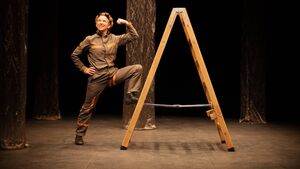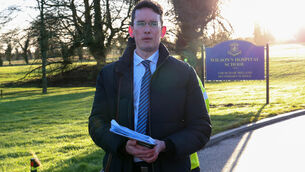'It's not work when you're doing what you love'

Ballaghaderreen native Julie Sharkey wrote and performed the play 'An Ant Called Amy', which has been a huge success.
The world of the creative arts is not an easy one and you don’t need to tell Julie Sharkey that. Despite facing challenges within her chosen career over the years, the Ballaghaderreen native has persevered and made it a success.
A successful actress and playwright, Julie oozes love for her job when you are talking to her. And she still has dreams and aspirations, as she told me when we sat down to chat.
Julie, thanks for talking to me. Tell me a little about yourself.
I'm from Ballaghaderreen, born and reared - and went to school there. I went from there to train in the Gaiety School of Acting. That set me on my path to theatre and that life. I lived in Cork after that for nearly 20 years, and then went back to Dublin, and have found myself back in Ballaghaderreen again now.
What drew you to acting, Julie?
You know the way in school you don't really know what you want to be? Well, I always wanted to be a nurse, but I remember being really excited by any sort of theatre drama that might have floated across my path, which wasn't that much. The likes of Scór na nÓg was an example of that and we did a musical in secondary school, .
I just knew I loved it. I felt home, like I belonged there. I remember going to the principal at the time and asking about how do you get into acting. I remember ringing a couple of theatres - the Abbey Theatre and the Gaiety, asking, 'How do you do acting?' And the reply was that the only two places at the time were Trinity and Gaiety, and I auditioned for both.
But I also applied for nursing because I didn't know really about the world of drama or theatre. I got nursing in Galway, and I was headed to Galway to do that, and the Gaiety rang to say, 'We would love you to join'.
I had to go up to do a further audition with them and I remember just feeling, 'This is everything'. I rang home to to tell my Mam that the wanted me to start on Monday and my mum going, 'Okay, good luck, good stuff'.
So what was that part of the journey like for you in the Gaiety School?
It's a two-year course in the Gaiety School, and it was incredible in every way. You learn great lessons there. You learn that it's the best profession in the world, the toughest profession in the world.
Richard Cooke was our administrator at the time, who went on to set up the Kilkenny Laughs Festival and numerous other things - a brilliant man. He always said, 'Whatever you do, don't fall into the Bewley's syndrome', which is go to Bewley's and sit chatting about work or pretending you're writing something. Be active, be busy, make the work, make the work. Don't be waiting for the telephone to ring, get working, get creating so that you draw attention to yourself. You bring people to you that way.
That was a great set-up and a great way to step into the world of trying to exist in it. But my God, it's not for the faint-hearted because there are lean times. When I graduated, I set up a theatre company in Carlow with my great pal who was from there.
Tully's Pub in Carlow was a real institution and they had a theatre space underneath one of their bar, Buzz, as it was called - an 80-seater theatre. P.J., who ran it at the time, told us we could have it for free and be their resident company, so that's what we did. But we always said that if we got paid theatre work that we would just jump on it. That's what happened for me. I was in Carlow for a year, and then I was offered to work with the brilliant Graffiti Company in Cork. My life in Cork started there, and I stayed for 20 years working with Graffiti, with the Everyman, with the Opera House, writing plays, making films. I'm very proud to say we were the reason Mick Hannigan set up the Made in Cork section in the Cork Film Festival, which is huge now.
You’ve had challenges at time too, Julie.
There were some tough times. I remember coming back from Cork with my lovely mum, she had come down for a few days and we were travelling back to Ballaghaderreen, and I was really unsure about my path. I was telling her I had reapplied to go back to do nursing. This is a brilliant world when you're busy in it, but when you're not, it's struggling with lots of challenges.
I remember saying to her, 'What do you think? I feel a bit like I failed if I go back and I do the nursing'. I remember her saying to me, 'Julie, you can never say you failed if you've given something your best shot'. So I did apply and did get it and didn't take it again because it really made me ask myself, 'Do I really want to go this road now after all I've done?' And I didn't really.
But you have managed to marry the health part into your work, Julie.
Yes, I actually have. I've always worked in arts and health. Even from a young age through gymnastics, through Ena Staunton and St Michael's School in Castlerea. I have always stayed in that world of intellectual disability, and here I am right this day in rehearsals for Christian O'Reilly's play about Martin Naughton. I feel very, very lucky to have done that. All those years in Cork, I worked in a brilliant centre in Youghal called St Raphael’s, which was a HSE Centre. With that group we devised, created plays, films, radio soap operas.
You covered a lot of ground in your field but writing has been a huge part of it.
The first time I sat down properly to write was when I was a theatre artist-in-residence at Roscommon Arts Centre, which has been an unbelievable support over the years with Roscommon artists in general. Then I had the opportunity to write, and I knew I wanted to write a couple of ideas. I wanted to write a children's play and a regular play. That's what I did.
Both those plays had presentations at the end of my residency there. The children's play was , which has just exploded in the last year. It is particularly dear to me because I lost my brother Johnny at the time. John has two small girls who were two and one at the time, and I just began to think about how a small person can begin to comprehend loss and grief. That's where the little play came from. Roscommon produced it.
We had a national tour in 2022, and then it just took off - Edinburgh International Festival took it, Babaró brought it on in Galway, we're headed to London in the New Year, and Australia the year after, so it's on and on we go. Then my other play, the grown-up one, is a play with the title, , which is a working title that seems to be sticking. I'm writing that with the brilliant Michael Murphy, who's is just a legend on the theatre scene as a writer and a performer. Again, it's all familiar small-town, west of Ireland stuff.
You are working on that very interesting project about Martin Naughton too.
It's a project that I've been involved in for probably six years now. It's a play by Christian O'Reilly called , and it's inspired by the life of Martin Naughton, who Christian worked with many, many years ago.
Martin was a Spiddal man who went to school in St Mary's in Baldoyle. He was one of the founders of the Centre for Independent Living. In his community, he would be known as the Michael Collins of the disability world. He was a formidable character, likeable and a pain in the ass as well. But he made change. Because he had a degenerative form of muscular dystrophy, nothing held him back, so he was bold in the way he behaved with authority and in achieving his goals. He was the main person behind getting personal assistance for people with severe disabilities.
This play is inspired by him. It's not completely autobiographical at all. But Christian had tackled this job years ago to write something, and it was picked up by a film company, and the script changed so much. It did become a really great film called , with James McAvoy in it. But Christian felt that it wasn't the script he wanted, so he came back to it again. Martin, unfortunately, passed away in 2016,
We have a brilliant dramaturge working with us called Peter Kearns, who's based in Leitrim. It's all about independence and equality. We have wonderful people on board with us in terms of the venues who are on the tour - Black Box in Galway, Backstage Theatre in Longford, glór in Ennis and The Civic Theatre in Tallaght, and everybody's making shifts in terms of accessibility to make it all balance out. A huge debate is going on at the moment now about disabled performers. Should it be disabled performers in disabled roles? Of course, it should be.
You've taken leaps of faith at various points in your career, Julie. What advice would you give someone wanting to do exactly that?
I think you just got to do it, don't you? I think you just have to jump in. As my mum said in the car that day, you'll never have any regrets if you give something your best shot, and then you can say you've given it your best shot.
I think whatever job you're doing if you love it, you won't work a day in your life. I really do feel that that's the case with me. I think if you have a notion or an inkling to give something a go, give it a go.
Speaking of that, giving something a go - here I am in Galway, and every time I'm in Galway, I write a little note to Garry Hynes. Garry was born in Ballaghaderreen and because of her, Druid is always associated with Ballaghaderreen. So I'm always knocking on the door going, 'I'm back again, I'm in Galway. Come and see me. I would love to work with Druid at some stage.' It's the dream.




